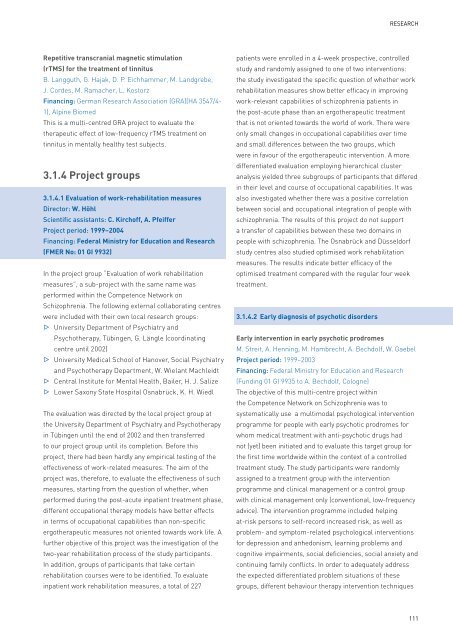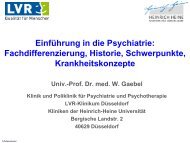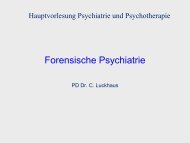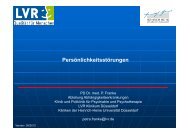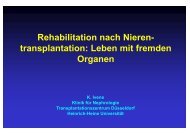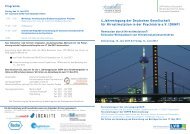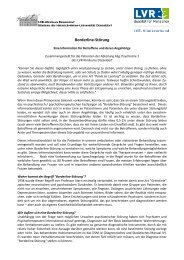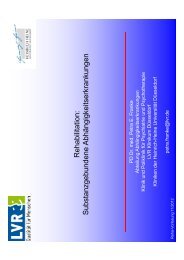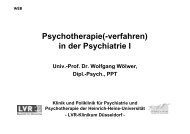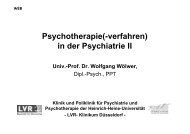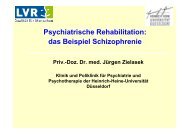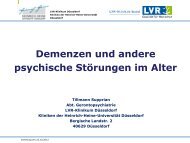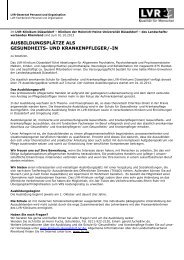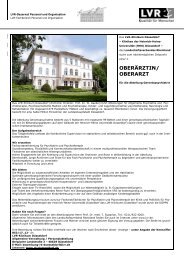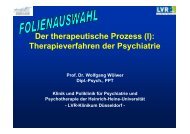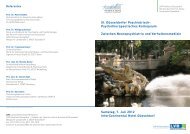LVR-Klinikum Düsseldorf Hospital of the Heinrich-Heine University ...
LVR-Klinikum Düsseldorf Hospital of the Heinrich-Heine University ...
LVR-Klinikum Düsseldorf Hospital of the Heinrich-Heine University ...
Create successful ePaper yourself
Turn your PDF publications into a flip-book with our unique Google optimized e-Paper software.
Repetitive transcranial magnetic stimulation<br />
(rTMS) for <strong>the</strong> treatment <strong>of</strong> tinnitus<br />
B. Langguth, G. Hajak, D. P. Eichhammer, M. Landgrebe,<br />
J. Cordes, M. Ramacher, L. Kostorz<br />
Financing: German Research Association (GRA)(HA 3547/4-<br />
1), Alpine Biomed<br />
This is a multi-centred GRA project to evaluate <strong>the</strong><br />
<strong>the</strong>rapeutic effect <strong>of</strong> low-frequency rTMS treatment on<br />
tinnitus in mentally healthy test subjects.<br />
3.1.4 Project groups<br />
3.1.4.1 Evaluation <strong>of</strong> work-rehabilitation measures<br />
Director: W. Höhl<br />
Scientific assistants: C. Kirch<strong>of</strong>f, A. Pfeiffer<br />
Project period: 1999–2004<br />
Financing: Federal Ministry for Education and Research<br />
(FMER No: 01 GI 9932)<br />
In <strong>the</strong> project group “Evaluation <strong>of</strong> work rehabilitation<br />
measures”, a sub-project with <strong>the</strong> same name was<br />
performed within <strong>the</strong> Competence Network on<br />
Schizophrenia. The following external collaborating centres<br />
were included with <strong>the</strong>ir own local research groups:<br />
s <strong>University</strong> Department <strong>of</strong> Psychiatry and<br />
Psycho<strong>the</strong>rapy, Tübingen, G. Längle (coordinating<br />
centre until 2002)<br />
s <strong>University</strong> Medical School <strong>of</strong> Hanover, Social Psychiatry<br />
and Psycho<strong>the</strong>rapy Department, W. Wielant Machleidt<br />
s Central Institute for Mental Health, Bailer, H. J. Salize<br />
s Lower Saxony State <strong>Hospital</strong> Osnabrück, K. H. Wiedl<br />
The evaluation was directed by <strong>the</strong> local project group at<br />
<strong>the</strong> <strong>University</strong> Department <strong>of</strong> Psychiatry and Psycho<strong>the</strong>rapy<br />
in Tübingen until <strong>the</strong> end <strong>of</strong> 2002 and <strong>the</strong>n transferred<br />
to our project group until its completion. Before this<br />
project, <strong>the</strong>re had been hardly any empirical testing <strong>of</strong> <strong>the</strong><br />
effectiveness <strong>of</strong> work-related measures. The aim <strong>of</strong> <strong>the</strong><br />
project was, <strong>the</strong>refore, to evaluate <strong>the</strong> effectiveness <strong>of</strong> such<br />
measures, starting from <strong>the</strong> question <strong>of</strong> whe<strong>the</strong>r, when<br />
performed during <strong>the</strong> post-acute inpatient treatment phase,<br />
different occupational <strong>the</strong>rapy models have better effects<br />
in terms <strong>of</strong> occupational capabilities than non-specific<br />
ergo<strong>the</strong>rapeutic measures not oriented towards work life. A<br />
fur<strong>the</strong>r objective <strong>of</strong> this project was <strong>the</strong> investigation <strong>of</strong> <strong>the</strong><br />
two-year rehabilitation process <strong>of</strong> <strong>the</strong> study participants.<br />
In addition, groups <strong>of</strong> participants that take certain<br />
rehabilitation courses were to be identified. To evaluate<br />
inpatient work rehabilitation measures, a total <strong>of</strong> 227<br />
ReseaRch<br />
patients were enrolled in a 4-week prospective, controlled<br />
study and randomly assigned to one <strong>of</strong> two interventions:<br />
<strong>the</strong> study investigated <strong>the</strong> specific question <strong>of</strong> whe<strong>the</strong>r work<br />
rehabilitation measures show better efficacy in improving<br />
work-relevant capabilities <strong>of</strong> schizophrenia patients in<br />
<strong>the</strong> post-acute phase than an ergo<strong>the</strong>rapeutic treatment<br />
that is not oriented towards <strong>the</strong> world <strong>of</strong> work. There were<br />
only small changes in occupational capabilities over time<br />
and small differences between <strong>the</strong> two groups, which<br />
were in favour <strong>of</strong> <strong>the</strong> ergo<strong>the</strong>rapeutic intervention. A more<br />
differentiated evaluation employing hierarchical cluster<br />
analysis yielded three subgroups <strong>of</strong> participants that differed<br />
in <strong>the</strong>ir level and course <strong>of</strong> occupational capabilities. It was<br />
also investigated whe<strong>the</strong>r <strong>the</strong>re was a positive correlation<br />
between social and occupational integration <strong>of</strong> people with<br />
schizophrenia. The results <strong>of</strong> this project do not support<br />
a transfer <strong>of</strong> capabilities between <strong>the</strong>se two domains in<br />
people with schizophrenia. The Osnabrück and <strong>Düsseldorf</strong><br />
study centres also studied optimised work rehabilitation<br />
measures. The results indicate better efficacy <strong>of</strong> <strong>the</strong><br />
optimised treatment compared with <strong>the</strong> regular four week<br />
treatment.<br />
3.1.4.2 Early diagnosis <strong>of</strong> psychotic disorders<br />
Early intervention in early psychotic prodromes<br />
M. Streit, A. Henning, M. Hambrecht, A. Bechdolf, W. Gaebel<br />
Project period: 1999–2003<br />
Financing: Federal Ministry for Education and Research<br />
(Funding 01 GI 9935 to A. Bechdolf, Cologne)<br />
The objective <strong>of</strong> this multi-centre project within<br />
<strong>the</strong> Competence Network on Schizophrenia was to<br />
systematically use a multimodal psychological intervention<br />
programme for people with early psychotic prodromes for<br />
whom medical treatment with anti-psychotic drugs had<br />
not (yet) been initiated and to evaluate this target group for<br />
<strong>the</strong> first time worldwide within <strong>the</strong> context <strong>of</strong> a controlled<br />
treatment study. The study participants were randomly<br />
assigned to a treatment group with <strong>the</strong> intervention<br />
programme and clinical management or a control group<br />
with clinical management only (conventional, low-frequency<br />
advice). The intervention programme included helping<br />
at-risk persons to self-record increased risk, as well as<br />
problem- and symptom-related psychological interventions<br />
for depression and anhedonism, learning problems and<br />
cognitive impairments, social deficiencies, social anxiety and<br />
continuing family conflicts. In order to adequately address<br />
<strong>the</strong> expected differentiated problem situations <strong>of</strong> <strong>the</strong>se<br />
groups, different behaviour <strong>the</strong>rapy intervention techniques<br />
111


